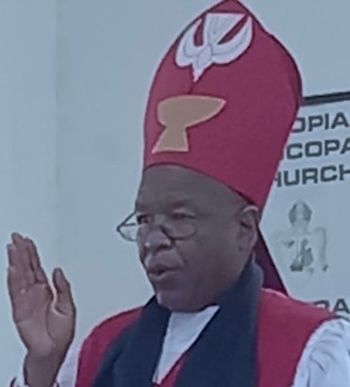Nkosinathi Ngesi

Summary: Nkosinathi Ngesi, an archbishop of the Ethiopian Episcopal Church, anti-apartheid activist, and rights defender, uses the pulpit to challenge misrule and organises protests against poor service delivery and graft in Makhanda, South Africa. In 2020 Ngesi and his colleagues formed the Concerned Makhanda Residents, a social justice movement and pressure group to advocate for proper service delivery in Makhanda municipality. Ngesi’s work is not without challenges: Detractors lie about him. in an attempt to sabotage his work. As a youth, he was arrested and spent some time in police custody for criticising the apartheid regime. Nonetheless, Ngesi is determined to continue his work.
Profile: Archbishop Nkosinathi Ngesi, son of anti-apartheid Mthuthuzeli Sidwel Buwa, who spent ten years in Robben Island for political organising, was born and raised by his mother, Mary Ngesi. Ngesi started his activism when he was young: “I grew up as an activist. As a result, I was sent to prison.” Since then, he has never looked back.
Unlike his father, who did not envisage a world where Whites could be welcomed in a Black community, Ngesi had a different political ideology: a society where people of all racial groups live together.
“I digressed from my father’s political views,” he says, “and non-racialism is the foundation in which I believe.”
After a formal education, Ngesi chose to minister in the Ethiopian Episcopal Church, “a Black-owned and Black-led church formed in 1875, whose purpose was to liberate Africans from the shackles of colonialism, apartheid, and oppression.” His intention was to be able to continue the struggle in the way of ministry. He prioritised organising, centering his work in Makhanda. With a population of 75,000, Makhanda has received poor service delivery for the past decade.
“People of Makhanda are suffering right under the nose of the ANC (African National Congress)-led local government,” asserts Ngesi. “Corruption, service delivery issues like lack of clean water, roads . . . Everything is in a mess here. . . . I decided to stand up and fight for my people from today’s oppressors, our local ANC-led government.”
While some church leaders are accused of using the pulpit to make money, Ngesi uses scriptures to encourage congregants to resist anarchy and to organise for social change. In 2020, during an opening service of a leadership conference in the Eastern Cape Province, attended by 19 delegates from the province and the mayor of Makana, he challenged church leaders and the local government authority to crack down on corrupt municipal officials. That same year, Ngesi and his colleagues staged a peaceful protest outside the City Hall in Makhanda, as part of the South African Council of Churches anti-corruption drive, calling for greater accountability and transparency. His message was “Protect your democratic gains and stand up for your constitutional rights without fear or favour.”
In 2022, Ngesi inspired his community members and church congregants to form Pandelani Community Development, a faith-based and independent organisation to promote the development of a cohesive society. When Covid-19 broke out, Ngesi encouraged residents to “defend themselves, their families, and other people by observing and practising Covid regulations.” During the Release Zuma protests, he condemned violence and the burning of businesses as a threat to investment:
“I was saying people must respect the law irrespective of who was involved. So the destruction of property was wrong, and it is still wrong. It negatively affects the economy for all of us.”
Recently, Ngesi and his colleagues formed the Concerned Makhanda Residents to mobilise citizens toward fighting for social justice. He describes the organization’s activities: “We facilitate programs such as pressuring the local government to bring services to the people. We have already delivered to a community that did not have water for a full seven days. Can you imagine the health hazard to that community?” Barely a few days after establishing the group, Ngesi led hundreds of protesters to demand accountability for the poor service. They handed a petition to the Department of Cooperative Governance and Traditional Affairs, demanding restoration of service and removal of the Makana Municipal mayor, municipal manager, and chief financial officer. The following month, Concerned Makhanda Residents held a “water funeral” to lament the deteriorating water shortage in Vergenoeg, a working-class community that had been without water for weeks. Despite opponents’ attempts to sabotage the protest by disseminating false news reports, hundreds of protestors participated.
Ngesi’s work is not without challenges: “My time and space, my personal resources, and my dignity—It's not easy,” said Ngesi. “I am at risk of being physically attacked or assassinated. The mayor circulated a WhatsApp message that clergy are liars and evil. Some of her subordinates even insinuated that I am personally fighting the ANC, which is not the case. I am only fighting corruption, maladministration, and incompetence. If the ANC falls in this category, so be it.”
Despite the apparent danger to his life, Ngesi persists: “I will continue this struggle to liberate my people from poverty and oppression that is imposed by an administration until I go to my eternal rest. This is the way of justice.”
